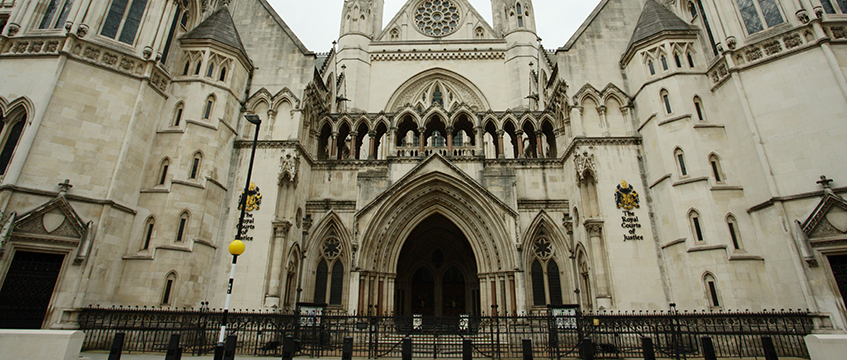In what is likely to become a landmark ruling on the rights of gypsies and travellers, London’s Court of Appeal has told local authorities that they should attempt to engage with the communities long before taking legal action.
The comments were made in a ruling handed down yesterday in which a two-judge panel refused to give the London Borough of Bromley a five-year injunction stopping “persons unknown” from setting up camps on all public land in the borough apart from highways and cemeteries.
Although it uses the term ‘persons unknown’, the injunction was “aimed squarely” at the gypsy and traveller community, accord to Lord Justice Coulson, who wrote the judgment.
And, although this case specifically refers to Bromley, the challenge is intended as a test case for all local authorities. Four other London boroughs have intervened in the case and, according to the ruling, many local authorities across England have sought similar court orders.
It was brought by campaign group London Gypsies and Travellers and, according to the ruling, it is the first time that the communities have been properly represented in High Court and Court of Appeal ‘persons unknown’ injunction proceedings.
The ruling upholds a decision made by a High Court judge in May. In that ruling the judge, Leigh-Ann Mulcahy QC, rejected Bromley’s request, saying that a de facto five-year blanket ban across the borough was disproportionate.
The appeal judges agreed, saying that there was “no error” in her reasoning.
However, the judgment, written by Lord Justice Coulson, then goes beyond the specifics of the case and includes “wider guidance” on how local authorities should deal with travelling communities.
He said that there is “an inescapable tension between gypsies’ and travellers’ human rights as travelling communities and the common law of trespass”.
“The obvious solution is the provision of more designated transit sites for the gypsy and traveller community,” he wrote.
There are no such sites in Greater London, according to the ruling.
“It is a striking feature of many of the documents that the court was shown that the absence of sufficient transit sites has repeatedly stymied any coherent attempt to deal with this issue,” the judge continued.
“The reality is that, without such sites, unauthorised encampments will continue and attempts to prevent them may very well put the local authorities concerned in breach of” human rights law.
Dialogue, he said, is key.
“It therefore follows that local authorities must regularly engage with the gypsy and traveller community… through a process of dialogue and communication, and… it should be possible for the need for this kind of injunction to be avoided altogether.
“‘Negotiated stopping’ is just one of many ways referred to in the English caselaw in which this might be achieved.”
If a local authority considers that an injunction may be the only solution, “it will still be of the utmost importance to seek to engage with the gypsy and traveller community before seeking any such order if time and circumstances permit.”
“Welfare assessments should be carried out, particularly in relation to children. An up-to-date EIA [equality impact assessment] will always be important because the impact on the gypsy and traveller community will vary from borough to borough and area to area. In my view, if the appropriate communications, and assessments (like the EIA) are not properly demonstrated, then the local authority may expect to find its application refused.”
In addition, ‘persons unknown’ injunctions should be “exceptional measures” as the targets of such injections usually don’t appear in court to plead their side of the case.
“In order for proportionality (or an equilibrium) to be met in these cases, it is important that local authorities understand and respect the gypsy and traveller community’s culture, traditions and practices, in so far as those factors are capable of being realised in accordance with the rule of law,” he wrote.
Not only are ‘persons unknown’ injunctions a last resort, but borough-wide ones are “inherently problematic”.
“They give the gypsy and traveller community no room for manoeuvre. They are much more likely to be refused by the court as a result (as happened here).”
And five-year injunctions are also far too long, he said. In fact, if a borough requests one it is likely to be “fatal” to their case.
Finally, it must be recognised that the cases referred to above make plain that the gypsy and traveller community have an enshrined freedom not to stay in one place but to move from one place to another,” he wrote.
“An injunction which prevents them from stopping at all in a defined part of the UK comprises a potential breach of both the Convention [on Human Rights] and the Equality Act, and in future should only be sought when, having taken all the steps noted above, a local authority reaches the considered view that there is no other solution to the particular problems that have arisen or are imminently likely to arise.”
The Mayor and Burgesses of the London Borough of Bromley -v- Persons Unknown
– and- London Gypsies and Travellers
(First Intervener) – and – the London Boroughs of Merton and Sutton and the Royal Borough of Kingston Upon Thames
(Second Intervener) – and – Liberty
(Third Intervener) – and – the London Boroughs of Merton and Sutton and the Royal Borough of Kingston Upon Thames
(Fourth Intervener)
Court of Appeal (Coulson LJ
and Haddon-Cave LJ) 21 January 2020
Richard Kimblin QC and Jack Smyth (instructed by London Borough of Bromley Corporate Services) for the Appellant
The Respondents did not appear and were not represented
Marc Willers QC and Tessa Buchanan (instructed by The Community Law Partnership) for the First Intervener
Steven Woolf (instructed by South London Legal Partnership) for the Second Intervener
Jude Bunting (written submissions only) for the Third Intervener
Caroline Bolton (written submissions only) for the Fourth Intervener








